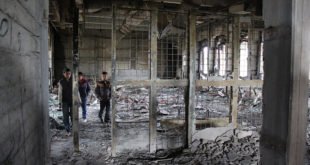Ali Al Ahmad, director of Abu Dhabi TV, and Nart Bouran ( see TBS 10 Interview with Nart Y. Bouran, Director of the Abu Dhabi TV News Center ) were in Dubai on October 8, 2003 to observe the Arab Media Summit. Abdallah Schleifer interviewed them for TBS.
TBS: Abu Dhabi came out of the blue as a 24-hour television channel in time for the Iraq war. Why did you go back to your old position after the war, when you had an edge over most other news channels?
Ali Al Ahmed: We knew this war was coming and we knew it was going to be big. So we sat down and said there are two choices: either we duck, or we go inside and become a source for it and give it to the public.
With the second choice we had do a lot of work on the technical and production side, but it wasn't meant to change the television to become a 24 hours news channel. We decided that the cut off would be the war. We thought about it and said, "We are covering an event, and if we cover the event, we have to make it distinguished." After this decision, we put a lot of sources in Baghdad. At one point we had 80 people.
After the fall of Baghdad we put in 60. We used to do our main daily talk shows from Baghdad itself. At that point we were shifting back gradually. So the channel went back to having the multiplicity of a general channel.
TBS: When you went back, did you go completely back or did you retain a little more of news and public affairs?
Ali Al Ahmed: There is a news bulletin at a fixed time. Standard things didn't change.
TBS: Wasn't that a lost opportunity? You acquired all this news operation capacity and then you receded?
Ali Al Ahmed: I would agree with you if you go into the domain of that event, but if you talk about Abu Dhabi TV, what does it want to do, then you want to go into news, but there is no need to make it a 24-hour news channel. The viewership during the war was said to be a success; we know it was a success. The audience was made up of people who don't usually watch news, for example sports fans. It would be misleading to build on those numbers because of just one event.
TBS: Two reasons why you might have wanted to stay with the 24-hour news format: one, you achieved success out of nowhere, you were a pioneer, and you achieved this extraordinary niche for your coverage-Al Arabiya wasn't up to it and Al Jazeera was offering an alternative Arab perspective; two, since the war in Iraq ended, two things have happened. The crisis has not gone away, it is more serious and it's having profound domestic repercussions.
Nart Bouran: I think there are two things. We never thought we were going to do this, to launch a news channel on the back of a war. You have to prepare for this. We are not a news channel and we never were and we didn't plan to be after the war. We looked at viewers' choices during the war which would have been due to the war, but to launch a news channel on the back of a war that was never the intention and we know that people's interests change. That doesn't mean that we won't have a 24-hour news channel from Abu Dhabi.
Covering 24 hours of news during the war is not covering 24 hours in a non-war situation. You would have to distinguish yourself in times of big events, but you don't prepare to become a news channel at the end of the day. If we do plan to do it, we have to think of something different. With all the negative publicity Fox gets, as a format of a program, it is different from other channels. The format is attractive to some. So if you are going to go with a news channel you are going have to look and sound a bit different. I think all the TV channels in the area are similar. You want to be innovating and not imitating.
TBS: Could we assume you are thinking about it?
Nart Bouran: There is no decision. I think it's being discussed and it's being thought of. And if it's launched it's going to take time. We have to think through it.
But also, who says people are only interested in news? If you talk about responsibility, we are doing what we think is responsible.
TBS: My sadness is predicated on the fact that I live in the world of journalism and I just feel Arab journalism is in desperate need for an organization like yours.
Nart Bouran: We went to the World Cup. We didn't say after the World Cup that we are going to go look for another World Cup to cover elsewhere immediately after.
TBS: So you are back to your old scheduling?
Nart Bouran: We do 6 hours of news a day, which is a lot. And that is not including talk shows.
TBS: You are still occupying a unique place?
Nart Bouran: We are putting on more news than any other non-24-hour news channel. Al Madar is our midnight show. It is a news show. Then we also have a news bulletin that looks at the main events of the day.
TBS: The Arab World is terribly over-politicized. That was starting to fade away in the late 90's due in part to developments in the Arab-Israel conflict. Ironically it is 24-hour television like Al Jazeera and the events of 9/11 that have reinvigorated the ideological obsession with politics.
Nart Bouran: Those channels are there to satisfy the obsession. There is plenty of news out there. All these news channels that are coming up are not self-sustainable, they're subsidized. I think in the next few years, a lot of things are going to collapse. In a few years they are going to see whether channels have achieved attained their goals.
TBS: What will happen when that realization comes about that it's not sustainable-will they decline in numbers? Will they change to American format, to rely on advertising revenue?
Nart Bouran: Some might go away, some might need more money, and some might shrivel. If you want to be a serious broadcaster, you have to look at the industry; you have to be very very careful about what you want to do. Some channels crash and their backers pump in more money. So maybe you want to wait and take your time and see if you want to do it properly.
There is a huge problem with training journalists; it's a bit incestuous. This channel is paying more money to these journalists than the other. Then you see journalists bouncing around.
TBS: Is Abu Dhabi TV self-sustaining?
Nart Bouran: We are just like everybody else. We are subsidized.
TBS: How do you think you reached instant success?
Nart Bouran: We covered the war thinking we are going to be very balanced. A model that nobody can blame. If someone says we were leaning I won't believe it because we look at both sides of all issues.
We went to a conference in to the States, because we were invited. I remember the passport control in LAX. We told him that we work for Abu Dhabi and he knew it. And we got into a conversation about Al Jazeera and Abu Dhabi TV and he was saying how he liked Fox News.
TBS: Rumor has it that you were using camera men from other news channels and not your own in the field in Iraq. Can you confirm that for us?
Nart Bouran: They were all our cameramen, working full time for Abu Dhabi TV.
 Arab Media & Society The Arab Media Hub
Arab Media & Society The Arab Media Hub




